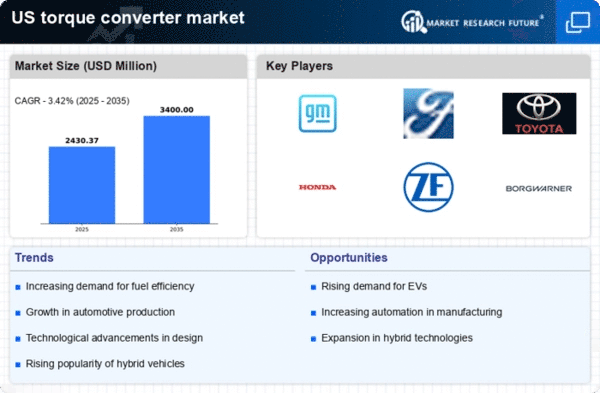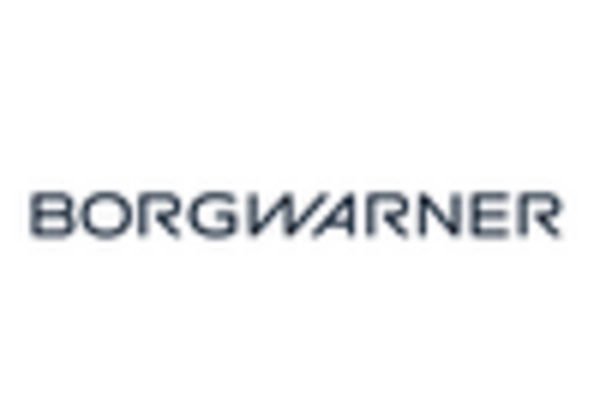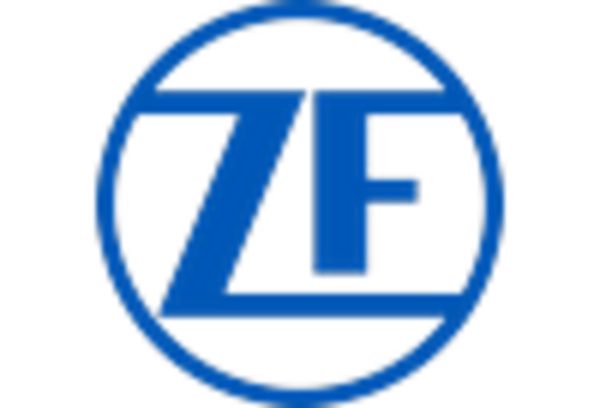Growth in Automotive Production
The torque converter market is significantly influenced by the growth in automotive production within the US. As manufacturers ramp up production to meet consumer demand, the need for efficient and reliable torque converters becomes paramount. In 2025, the US automotive production is expected to reach around 12 million units, indicating a robust recovery and growth trajectory. This increase in production directly correlates with the demand for torque converters, as they are critical components in automatic transmissions. Furthermore, the shift towards more complex transmission systems necessitates advanced torque converter technologies, which could lead to increased market opportunities for manufacturers in the torque converter market.
Regulatory Push for Emission Reductions
The torque converter market is also influenced by regulatory pressures aimed at reducing vehicle emissions. In the US, stringent emission standards are prompting manufacturers to develop more efficient powertrains, which include advanced torque converters. These components are essential for optimizing engine performance and minimizing fuel consumption, thereby aiding compliance with regulations. As of 2025, it is projected that the torque converter market will see a growth of around 10% as manufacturers invest in technologies that enhance efficiency and reduce emissions. This regulatory environment is likely to drive innovation within the torque converter market, as companies strive to meet both performance and environmental standards.
Rising Demand for High-Performance Vehicles
The torque converter market is experiencing a notable surge in demand. This surge is driven by the increasing popularity of high-performance vehicles. As consumers seek enhanced driving experiences, manufacturers are compelled to innovate and improve torque converter designs. This trend is particularly evident in the sports and luxury vehicle segments, where advanced torque converters are essential for optimizing power delivery and fuel efficiency. In 2025, the market for high-performance vehicles in the US is projected to grow by approximately 15%, which directly correlates with the torque converter market's expansion. The integration of advanced materials and technologies in torque converters is likely to further enhance performance, thereby attracting more consumers to high-performance models.
Increased Focus on Hybrid Vehicle Development
The torque converter market is witnessing a shift due to the increased focus on hybrid vehicle development. As automakers invest in hybrid technologies, the demand for specialized torque converters that can efficiently manage power delivery between electric and internal combustion engines is rising. In 2025, the hybrid vehicle segment is expected to account for approximately 25% of total vehicle sales in the US, which will significantly impact the torque converter market. This trend suggests that manufacturers must adapt their offerings to cater to the unique requirements of hybrid systems, potentially leading to new innovations and market opportunities within the torque converter market.
Technological Advancements in Transmission Systems
Technological advancements in transmission systems are playing a crucial role in shaping the torque converter market. Innovations such as continuously variable transmissions (CVTs) and dual-clutch systems are becoming more prevalent, necessitating the development of specialized torque converters. These advancements not only improve vehicle performance but also enhance fuel efficiency, aligning with consumer preferences for more economical vehicles. In 2025, it is anticipated that the adoption of advanced transmission technologies will increase by approximately 20%, thereby driving demand for sophisticated torque converters. The torque converter market must adapt to these changes, ensuring compatibility with new transmission designs and maintaining performance standards.
.png)
















